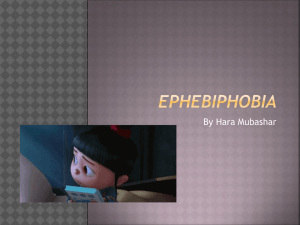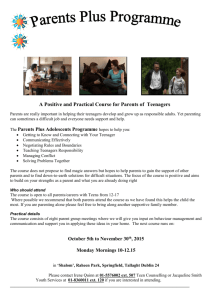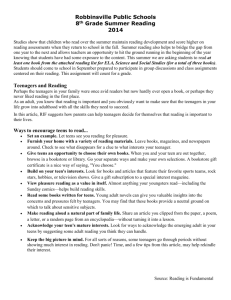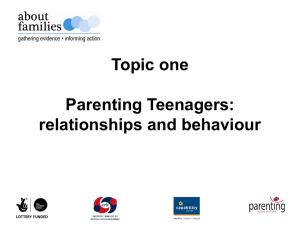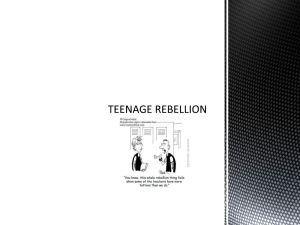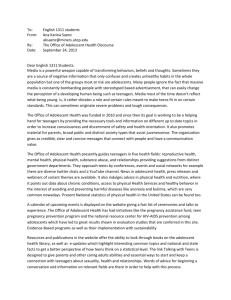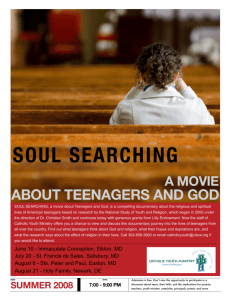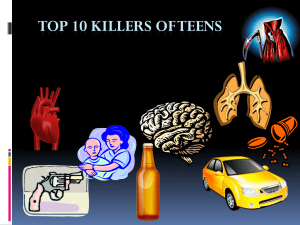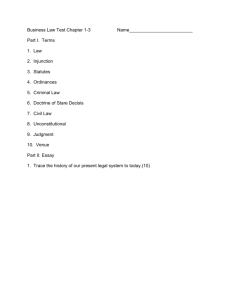The Space Between Leader's Guide.pub
advertisement
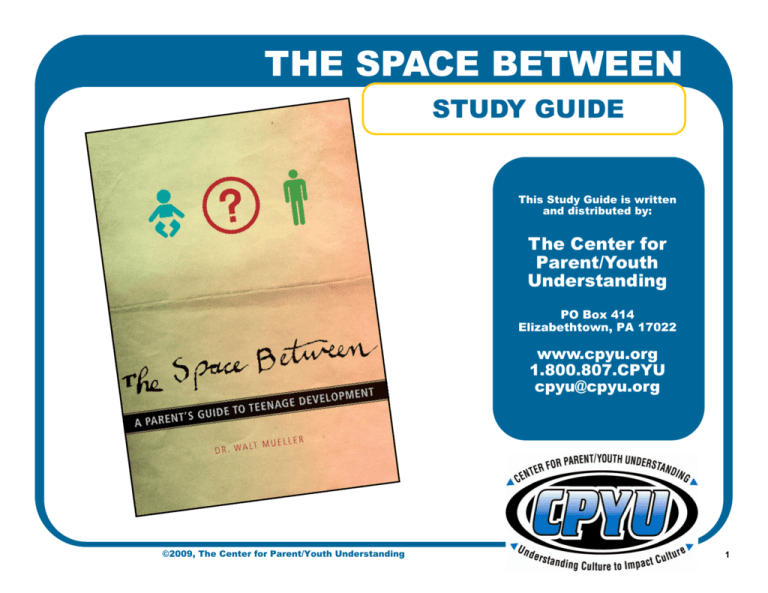
THE SPACE BETWEEN STUDY GUIDE This Study Guide is written and distributed by: The Center for Parent/Youth Understanding PO Box 414 Elizabethtown, PA 17022 www.cpyu.org 1.800.807.CPYU cpyu@cpyu.org ©2009, The Center for Parent/Youth Understanding 1 THE SPACE BETWEEN STUDY GUIDE Overview If they aren’t there already, your children will someday be teenagers. Sadly, parenting teens has become one of the most dreaded and misunderstood phases in the exciting journey of raising children. Much of this fear and dread is rooted in our own memories of what it was like to be a teenager once ourselves. It wasn’t easy then. The parenting fear factor gets amped up a few notches when you consider that the pressures, challenges, problems, choices, and expectations facing teenagers in today’s world are more complex than for previous generations. In his book The Space Between: A Parent’s Guide to Teenage Development, Dr. Walt Mueller of the Center for Parent/Youth Understanding sets out to help parents understand what kids in today’s culture face as they pass through the God-ordained process of growth and change. Believing that our fears can be alleviated through developing a deeper understanding of normal adolescent development, he offers a practical and hope-filled overview of adolescence that is built on principles from God’s Word along with years of experience in both studying youth culture and raising children of his own. An admitted “fellow-struggler” along with all other parents, Walt walks readers through his research and own experience to offer a vulnerable window into the developmental world of today’s teens. The Space Between will help you effectively parent teenagers as you explore how to: • Create a smoother adolescent period for your teen. • Understand how teens change and grow during the teenage years. • Begin to break through the walls of confusion, frustration, fear, and misunderstanding, thereby allowing you to more effectively fulfill your God-given role in nurturing your teen into a spiritually-healthy adulthood. • Build a healthy, positive, and God-honoring relationship with your teen. • Be a positive and pro-active bridge-builder into the life and world of your teenager. • Approach the task of parenting with the courage and hope that can only be found in Christ. • Point your teen to the liberating and life-giving message of redemption through Jesus Christ alone. ©2009, The Center for Parent/Youth Understanding www.cpyu.org About the author: Dr. Walt Mueller is the founder and President of the Center for Parent/Youth Understanding. He has worked with teenagers and their families for over 35 years. He is a speaker, author of numerous books, and the host of the daily radio show, Youth Culture Today which is heard on over 870 stations across North America. He lives in Pennsylvania with his wife, Lisa, and his four children (three grown. . . and one teenager). If you would like to learn more about CPYU or to schedule Walt to speak at your church, visit cpyu.org 2 THE SPACE BETWEEN STUDY GUIDE WHO SHOULD READ The Space Between? First and foremost, The Space Between has been written for use by parents. It is not, however, a book written only for parents of teens. While parents of adolescents will gain insight into what their kids are going through as teens, parents of pre-teens and children will benefit from reading and discussing The Space Between as preparation for what lies ahead. In addition, the book serves youth workers and teachers as an overview and reminder of issues related to adolescent development. Suggested Settings for Using The Space Between & Study Guide • Parents’ Sunday School Class • Small groups • Retreats • Neighborhood Study • Christian School Parents’ Meetings • Youth Group Parents’ Meetings • Individual reading and study • College and Seminary Youth Ministry Classes WHERE SHOULD THE STUDY GUIDE BE USED? The Study Guide is designed for use in a variety of settings. Youth workers are encouraged to teach and use The Space Between and the Study Guide in a parents’ Sunday School class, small group, or retreat setting. STUDY GUIDE FORMAT The Study Guide can be used in a 12-week format, or adapted by the leader for shorter use. Included are 11 sections that coincide with the book’s Introduction and each of the book’s 10 chapters. The leader can either lead from the Study Guide, or print out the appropriate page from the Study Guide and distribute one to each member of the group. An optional 12th meeting can be used for group discussion, any supplementary material the leader deems appropriate, and prayer. Each individual section of the Study Guide has three main components: (1) Scripture to Consider: biblical passages that connect to the main themes of the chapter and should be read aloud at the beginning of each meeting; (2) Quotations to Ponder: key quotes that provide a summary of each chapter which should be read aloud and discussed by the group; and (3) Questions to Discuss: questions based on the book’s content designed to generate thoughtful discussion, introspection, and personal response. At the end of each session, the leader should have each participant reflect quietly on what has been discussed and learned, prayerfully considering how to personally apply the lesson in their own home. Then, each participant should fill out the action plan at the bottom of the page. Participants should be given the opportunity to share their action plan with others in the group, and then end with a time of group prayer. ©2009, The Center for Parent/Youth Understanding www.cpyu.org 3 THE SPACE BETWEEN STUDY GUIDE INTRODUCTION Scripture to Consider: Joshua 1:5; Psalm 18:1&2; Proverbs 3:5&6; Colossians 3:21 Quotations to Ponder: “Parenting teenagers is an important, often joyful journey. But it’s not always easy. When you combine raising kids who are confused and sometimes frustrated by the changes going on inside of them (and outside of them) with the normal pressures of our adult lives, it leaves us equally confused and frustrated.” (p. 10) “In the early 20th century, adolescent studies pioneer G. Stanley Hall described adolescence as a period of ‘storm and stress.’ Perhaps this is why Sigmund Freud once suggested that adolescence is a temporary mental illness and his daughter, Anna Freud, added, ‘To be normal during the adolescent period is itself abnormal.’” (p. 12) Questions to Discuss: When you think about the words “teenager” and “adolescence,” what thoughts, emotions, fears, joys, and expectations come to mind? If you are the parent of a teenager, have your expectations for your teenager’s adolescent years been fulfilled? Not fulfilled? What surprises have your child’s teen years brought into your role as a parent? Has your parenting had to change? If so, how? If you are the parent of a pre-teen, what do you expect your child’s teen years to hold for your teen? For you as a parent? Walt mentions how parents often use words like “fear,” “confusion,” “frustration,” “misunderstanding,” and “help!” to describe the experience of parenting teens (p.11). What is it about parenting teens that causes us to choose more negative words to describe our experiences and feelings? Why aren’t we more positive? What habits and practices can we develop to move us from a posture of fear to a posture of great expectations as we embark on the journey of parenting adolescents? What are the implications of Joshua 1:15, Psalm 18:1&2, Proverbs 3:5&6, and Colossians 3:21 for our God-given calling as parents of teens? This week I will prayerfully rely on God to _____________________________________________________________ ©2009, The Center for Parent/Youth Understanding www.cpyu.org 4 THE SPACE BETWEEN STUDY GUIDE Chapter 1: Perspective Needed Scripture to Consider: Psalm 127:3-5; Genesis 3:6; James 1:2-4 Quotations to Ponder: “We must approach our task of parenting teenagers not as punishment, a problem, or a cross to bear, but as an opportunity to depend on God while teaching our impressionable teens to do the same.” (p. 17) “Because our teenagers are growing through the ever-changing years of adolescence, they’re incredibly vulnerable to the youth culture’s ability to shape their values, attitudes, and behaviors.” (p. 18) “Teenagers aren’t liabilities; they’re rewards from God given to us as a sign of God’s favor. God values them highly and so must we.” (p. 20) “Development is an ongoing process. It doesn’t happen instantaneously or overnight. Our role is to consistently model and speak truth in our children’s lives as they change and grow.” (p. 23) “Suffering is often a necessary step in the process of God refining us and our kids in His image and likeness.” (p. 29) Questions to Discuss: Which of the Seven Truths Walt mentions was most refreshing and relevant for you? Why? How has the nature and experience of adolescence changed since you were a teenager? How have these changes facilitated a cultural-generational gap between you and your child? Has it been your experience that the church is a place where you have to keep up appearances, or where you are able to be vulnerable regarding parenting difficulties? What should the church be? How does the burden of expecting perfection effect our parenting, our families, and our kids in negative ways? How should an understanding of our sinful nature (Genesis 3:6) influence the way we interact with our children and teens? Walt says “helpless is a good place to be” (pp. 25-29). Do you agree or disagree? Why? How have you experienced this reality in your own life? Read Psalm 127:3-5. What are some steps we can take to remind ourselves that our teenagers are a gift from God? What changes must you make to live out this reality in your home? This week I will prayerfully rely on God to ___________________________________ ©2009, The Center for Parent/Youth Understanding www.cpyu.org 5 THE SPACE BETWEEN STUDY GUIDE Chapter 2: The Earth Begins to Shake Scripture to Consider: Deuteronomy 6:1-9, 20-25 Quotations to Ponder: “Adolescence is a transitional state; teenagers are neither children nor adults.” (p. 31) “The complexity of the teenage years is compounded by the fact that all of these changes occur over a relatively short period of time—at least from our adult perspective. But since a week can seem like an eternity to teenagers, the adolescent years can seem to take forever.” (p. 31f). “Knowing the ways in which their children will soon be changing can prevent parents from being blindsided. Armed with a working knowledge of adolescent development, parents can correctly interpret their children’s behavior while helping them through the difficult transition from childhood to adulthood in God-honoring ways.” (p. 34) “Parents are to gradually ease their children into taking ownership of their own lives.” (p. 35) Questions to Discuss: Think back to your own teenage years. What was the most bewildering and confusing change you experienced during your own adolescence? How did your parents help you through that change and period of life? What evidence have you seen of adolescence commencing at increasingly younger and younger ages? Why do you think this is happening? What are the implications of this for how we parent? What evidence have you seen of adolescence continuing to later and later ages? Why do you think this is happening? What are the implications of this for how we parent? What current cultural pressures force our kids to grow up too soon? How can parents respond in God-honoring ways to buffer these pressures? What are some practical steps parents can take to move from a “season of survival” mentality to an “age of opportunity” perspective on parenting teens? According to Deuteronomy 6:1-9 and 20-25, what does God call us to do as our children pass through their adolescent years? What approaches have you taken in your own home to make this happen? This week I will prayerfully rely on God to ___________________________________ ©2009, The Center for Parent/Youth Understanding www.cpyu.org 6 THE SPACE BETWEEN STUDY GUIDE Chapter 3: Teenagers Changing Physically Scripture to Consider: Proverbs 15:1; Proverbs 18:2; Proverbs 18:13 Quotations to Ponder: “Back in the nineteenth century, the average age for the onset of puberty was 17. Today, it’s happening at an average age of 12.” (p. 37f) “The media pounds our kids with thousands of images daily, each one contributing to a set of appearance standards that become the benchmark for being normal, acceptable, likeable, and lovable.” (p. 40) “Life can be miserable for the boy or girl who grows up too fast or too slow. A loving and sensitive parent can serve as a buffer in the midst of the type of ridicule that could tarnish a child’s self-image.” (p. 42f) “Take the time to teach your children about the inward qualities of godliness. Perhaps the best and most powerful lessons will come not from your words, but from your example.” (p. 43) “We must live and promote a biblical sexual ethic so our children might experience the God-given gift of sexuality in all of its glorious and enjoyable fullness.” (p. 44) Questions to Discuss: With puberty occurring at younger and younger ages, when and how should parents begin discussing these changes with their children? What are some of the messages media sends to children about physical development and appearance? To adults? In what ways do parents directly and indirectly promote unhealthy body image standards? In what ways can parents directly and indirectly promote a Godly perspective on body image? How has culture shifted in attitudes towards sex and sexuality since you were a teenager? How can parents temper and correct the culture’s “all things are possible and permissible” message on sex and sexuality with a biblical sexual ethic? What are some practical steps you’ve taken to facilitate good communication with your teen? What are the bridge-builders for good give and take? What are the roadblocks that destroy good give and take? What can we learn our children and teens? from Proverbs 15:1, 18:2, and 18:13 about our role in opening the doors of communication with This week I will prayerfully rely on God to ___________________________________ ©2009, The Center for Parent/Youth Understanding www.cpyu.org 7 THE SPACE BETWEEN STUDY GUIDE Chapter 4: Teenagers Changing Socially Scripture to Consider: Romans 7:15; Matthew 7:13&14; Proverbs 13:20 Quotations to Ponder: “Adolescence is a time when teenagers begin to disengage from the family while building extensive and meaningful relationships with peers.” (p. 48) “During the teenage years, parents are no longer all-powerful and all-knowing. Your children now see you as you really are—a human being with faults.” (p. 49) “Studies, observation, and discussions with adolescents have all yielded the same result: Parents remain tremendously important and significant in the lives of their teenagers.” (p. 50) “From the time they’re born, your job is to prepare your children for a lifetime of service to God.” (p. 53) “Pulling away from your teenager is like pushing a default button that sends him out of the home to look elsewhere for guidance and direction. If you’re frequently absent or too busy, then you forfeit your positive influence.” (p. 54) Questions to Discuss: If you were Meredith’s parents, how would you have felt and responded to her after she arrived home from camp? Think back to your own teenage years. What shape did your disengagement from your parents take? How can your memories of your own experience help you better understand and respond to your kids as they disengage from you? How should parents respond when their faults are pointed out by their kids? How has the nature of peer pressure changed since you were a teen? Are the pressures today’s teens face any different from the pressures you faced when you were a teenager? The same? How? How can parents continue to build strong relationships and provide a safe and secure home base as their kids pass through the adolescent years? How do Proverbs 13:20 and Romans 7:15 speak to the issue of peer pressure and sin that we all—teenagers and parents alike—face on a day-to-day basis in today’s world? This week I will prayerfully rely on God to ___________________________________ ©2009, The Center for Parent/Youth Understanding www.cpyu.org 8 THE SPACE BETWEEN STUDY GUIDE Chapter 5: Teenagers Changing Intellectually Scripture to Consider: Proverbs 13:24; 22:6 Quotations to Ponder: “When all is said and done, the research shows that the brain may not be fully formed until the age of 24 or 25.” (p. 63) “Research is showing that a healthy and God-honoring sexual relationship strengthens the brain cell connections associated with the attachment of one person to another, helping to ensure the permanence of the relationship that finds its healthiest expression with sexual consummation in marriage.’” (p. 65) “Remember, your adolescent is not an adult. Therefore, you can expect a mix of developing and not-yet-there adult thinking ability tainted by immaturity, impulsivity, and inconsistent logic.” (p. 66) “Wise parents learn that while it’s important to continue to offer structure, guidance, direction, advice, and explanations to their offspring, they should also give their children some freedom to make their own decisions.” (p. 67). “Teenagers who sense they’ve been respected and heard are much more prone to listen to those who’ve first listened to them.” (p. 68) Questions to Discuss: How can recent research on brain development take us deeper into our understanding and appreciation of God and our teens? How should we balance developmental realities with our parental responsibility to provide boundaries, guidance, instruction, and discipline for our teens? In what ways do parents of teens hold the reigns too tightly? Too loosely? What are some concrete ways to enlist the principle of thinking with your teen now, so that they will be prepared to think for themselves in Godhonoring ways later in life? Read Proverbs 13:24 and 22:6. How do you think can parents be obedient to these instructions and fulfill their God-given calling when their children are teenagers? What, if any, shifts in approach should be enlisted as children pass from childhood into adolescence? This week I will prayerfully rely on God to ___________________________________ ©2009, The Center for Parent/Youth Understanding www.cpyu.org 9 THE SPACE BETWEEN STUDY GUIDE Chapter 6: Teenagers Changing Emotionally Scripture to Consider: I Timothy 3:16; Matthew 16:24 Quotations to Ponder: “As life gets harder and more complex for teenagers, the normal developmental issues they face are compounded by cultural pressures and relational breakdowns that make it that much harder.” (p. 72) “I’ve found it helpful to visualize the teenage years as ‘the earthquake of adolescence’: They arrive swiftly, pass quickly, and leave the landscape of a child’s life radically altered.” (p. 73) “More and more of our kids construct their own spiritual reality and beliefs using personal, subjective experience as their authority.” (p. 75) “Don’t base your mood, self-acceptance, or understanding of your own parental effectiveness on how your kids feel about you or treat you. Your role is to consistently love and encourage your child while finding your identity in Christ alone.” (p. 77) “Chances are your kids won’t be martyred. But they’ll suffer in this life. Many teenagers are suffering already. They need to know that growth usually comes through suffering.” (p. 80) Questions to Discuss: How did your feelings and emotions effect your life when you passed through the earthquake of adolescence? Are your memories of that time largely positive or negative? Why? Right now, what are the major “stressors” in your teenager’s life? How have you shown sensitivity and served to offer encouragement, understanding, and support? What steps can parents take to help their children ground their knowledge and understanding of God and life in His world in the truths of His Word, as opposed to their personal feelings and emotions? What “this I know’s” must children and teens hear and understand in order to live life to the glory of God in today’s world? What lessons have you learned in your own life about the relationship between faith, suffering, and spiritual growth? Read Matthew 16:24. How can parents help teens develop realistic expectations of what it means to follow Christ, and the resulting suffering that comes from time to time as we live the life of radical discipleship? This week I will prayerfully rely on God to ___________________________________ ©2009, The Center for Parent/Youth Understanding www.cpyu.org 10 THE SPACE BETWEEN STUDY GUIDE Chapter 7: Teenagers Changing Morally & Spiritually Scripture to Consider: Mark 12:28-34 Quotations to Ponder: “In today’s postmodern world in which the culture (and many teenagers) wears spirituality on its sleeve, your children will encounter a variety of spiritual options, faith systems, and combinations thereof that seem quite appealing.” (p. 84) “As a general (not hard-and-fast) rule, those teenagers whose parents have consistently taught and modeled the Christian faith will enter adulthood with a commitment to the faith they’ve been taught.” (p. 87) “We may not like or understand what’s happening, but these are times when God calls on us to be faithful and obedient followers of His Son while trusting in God’s sovereignty, timing, and plan.” (p. 87) “Today’s teenagers value authenticity and vulnerability in parents and other adults. Let’s face it—we are all sinful and fallen people whose lives have been marked by periods of struggle, doubt, problems, and failures. Sharing these with our children allows them to see us in our full humanity and dependence on God.” (p. 89) Questions to Discuss: How has our rapidly changing culture facilitated a world where teenagers have more spiritual options than in times past, and what unique challenges does that present to parents? If spiritual development is in fact a process that takes some time, what steps can parents take to encourage spiritual development while showing patience? What role should trust in the sovereignty of God play in our lives as we parent our teens through the adolescent years? What roles should honesty, vulnerability, and prayer play as we parent a struggling adolescent? Which of Walt’s suggestions (pp. 87-90) is most-needed in your home right now? What can parents do to prepare and sustain themselves for the time when their children will pass through the sometimes rocky process of making faith their own? Read Mark 12:28-34. According to this passage, what does mature and dedicated Christian faith look like? What are the implications of this for our role as parents of teens? This week I will prayerfully rely on God to ___________________________________ ©2009, The Center for Parent/Youth Understanding www.cpyu.org 11 THE SPACE BETWEEN STUDY GUIDE Chapter 8: Answers to Life’s Big Questions Scripture to Consider: Genesis 3:6-19; Exodus 20:1-4 Quotations to Ponder: “Curious and uncertain about life, teenagers are looking to make sense of the world and how they’re to live in it. This wasn’t an issue before humanity’s fall into sin. But in our post-Genesis 3:6 world, everything is broken and flawed. Thus, all humanity asks the basic questions that are fundamental to life as a human being.” (p. 92) “In the end every teenager chooses to find her identity in something. And it’s not just teenagers—it’s the most important issue for all of us.” (p. 92) “Ultimately, our identity can and must be found in Christ alone. We must be sure that with Augustine we are able to say, ‘Our hearts are restless until they find rest in Thee.’” (p. 100) “We must know their world in order to bring the light of the Word to bear on it.” (p. 101) “The who you are are sends strong messages about the who they’ve been made to be.” (p. 102) Questions to Discuss: When you were a teenager looking to find your identity, what idols solicited your worship and became important to you? What idols call for our teenagers’ attention in today’s world? Once we identify the idols our kids pursue, what steps should we take to understand and answer those idols? How can we effectively point kids to finding their identity in Christ alone? What practices and habits can parents develop to help them become more intentional and effective at “dual listening?” Because we live in a sinful and fallen world, identity formation is not a once-and-done matter. The more we find our identity in Christ the more frequent and difficult the challenges to our faith become. What disciplines should parents develop to ensure that their own identity isn’t found in idols? Read Exodus 20:1-4. What are the implications of this passage for your home environment, how your family spends their time, energy, and resources? This week I will prayerfully rely on God to ___________________________________ ©2009, The Center for Parent/Youth Understanding www.cpyu.org 12 THE SPACE BETWEEN STUDY GUIDE Chapter 9: Keep These Strategies In Mind Scripture to Consider: Romans 5:8; I Timothy 1:14&15; Luke 15:11-32 Quotations to Ponder: “God began with a family in Genesis, and God continues to use the family as the primary arena for bringing people to Himself.” (p. 104) “When God’s truths become the central overriding interest and purpose in our lives, teaching them to our children will happen almost subconsciously.” (p. 104) “If we’re to live out our God-given calling to model and teach the Christian faith to our kids in a relevant manner, then we need to understand the cultural forces shaping the head and heart commitments of our kids.” (p. 106) “Don’t ever forget, there’s no nook or cranny of our lives that lies outside of God’s rule and reign. The Scriptures speak to every teenage pressure, choice, problem, or situation.” (p. 108) “When mistakes, difficulty, and rebellion rear their ugly head in your home—and they will—remember how your heavenly Father has treated you.” (p. 111) Questions to Discuss: Read Deuteronomy 6:6-9. What unique challenges do parents face in today’s world to making God’s Word and a desire to glorify Him in all things their overriding desire and purpose in life? What steps must you take to readjust your life’s trajectory to that end? Which of the questions on page 105f do you find most personally challenging? Why? Read the quote from Dr. Paul Tripp on page 110. What steps can a family take to function as a “redemptive community?” Which of the strategies outlined in this chapter hit you the hardest? Why? What can and will you do about that? Share an example of how the Bible has served you as a bright light in the midst of a dark time in your parenting journey. Read the story of the Prodigal Son (Luke 15:11-32). How should this story shape our understanding of God and ourselves? Our need to parent redemptively? This week I will prayerfully rely on God to ___________________________________ ©2009, The Center for Parent/Youth Understanding www.cpyu.org 13 THE SPACE BETWEEN STUDY GUIDE Chapter 10: Getting Personal Scripture to Consider: Psalm 71:14-18 Quotations to Ponder: “As Cliff Schimmels has said, adolescence is ‘a time of transition for both the child and the parent. The child has to learn how to handle changing roles, moods, and body. You as parents have to learn to handle the changing child.’” (p. 118) “While we can’t excuse rebellious behavior, we do need to understand our teenagers better than they understand themselves.” (p. 119) “If you let them, teenagers can get under your skin and drive you crazy. If you understand them—and the changes taking place in their lives that they don’t even understand—then you can fulfill your God-given responsibility.” (p. 119) Questions to Discuss: What is greatest challenge you are currently facing as the parent of teens? What is the greatest challenge you are currently facing with yourself? What is the greatest challenge you are currently facing with your teen? Read Psalm 71:14-18. How does the Psalmist’s knowledge and experience inform his resolve? How does the Psalmist’s resolve challenge you as the parent of someone from the “next generation?” What are three changes you believe God is calling you to make in your life as a result of your study of The Space Between? What “business” has this study prompted you to do with God, your spouse, your children, and yourself? And what steps must you take to be sure that “business” is taken care of in a God-honoring manner? How can people pray for you as you continue in this wonderful journey of parenting teenagers? May the God who is parenting you bless you as you parent your teenager. And may God make you a blessing to your kids! This week I will prayerfully rely on God to ___________________________________ ©2009, The Center for Parent/Youth Understanding www.cpyu.org 14 THE SPACE BETWEEN STUDY GUIDE WHAT NOW?: A MESSAGE FROM WALT MUELLER I trust your experience reading and discussing The Space Between has been challenging and eye-opening. It’s my prayer that this exercise will bear great fruit for the Kingdom in the life of your family. But let me challenge you to see the end of this study as the beginning of a great God-given adventure. One aspect of that adventure is the need to continue to build on what you’ve learned. I wrote The Space Between to serve as a springboard into deeper learning on what it means to raise and relate to children and teens in today’s world. Let me challenge you to develop the resolve to continue reading, studying, observing, and learning. If you’re like me, learning convinces you of how little you actually do know, and how much more you should know. Our staff at the Center for Parent/Youth Understanding wants to help. Our website—cpyu.org—is updated daily with information and analysis on today’s youth culture and the adolescent experience. I hope you’ll carve out a few minutes to visit, browse, and see what’s there. Be sure to take some time while you’re there to learn about other resources (many of them free!) and books that will take you deeper into your understanding of what it means to honor and glorify God as you parent your teens. In addition to the books listed on pages 121-123 of The Space Between, here are some resources I’d like to highlight for you. First, there’s the absolute-best Christian parenting book I’ve ever read—Dr. Paul Tripp’s Age of Opportunity: A Biblical Guide to Parenting Teens (P&R Publishing). I have personally found this book to be helpful as we’ve parented our four children. The book is realistic, practical, hopefilled, Biblically-based, and full of vulnerability. I highly recommend this book as the basis for a small group discussion or class. Second, there are some books that I’ve written that complement what you’ve learned in The Space Between: Youth Culture 101 (Zondervan/Youth Specialties, 2007). Engaging the Soul of Youth Culture: Bridging Teen Worldviews and Christian Truth, (InterVarsity Press, 2006). I Want to Talk With My Teen About Movies, Music & More, (Standard, 2006). Opie Doesn’t Live Here Anymore: Where Faith, Family, and Culture Collide (Standard, 2007). Third, the Director of our CPYU College Transition Initiative, Derek Melleby, has co-authored a wonderful book for older high school students and college students on what it means to glorify God through the college experience - The Outrageous Idea of Academic Faithfulness (Brazos, 2007). Fourth, if you are looking for a helpful tool you can use with your teens to spark discussion about your teen’s music and media, check out our How to Use Your Head to Guard Your Heart: 3(D) Media Evaluation Guide which is available for order on our website—cpyu.org Finally, you can check our website and listen online to our daily one-minute radio spot, Youth Culture Today, at www.cpyu.org. May God bless you as you become a blessing to your children, Walt ©2009, The Center for Parent/Youth Understanding www.cpyu.org 15
